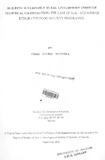| dc.contributor.author | Musyoka, Chris K | |
| dc.date.accessioned | 2013-05-21T06:52:11Z | |
| dc.date.available | 2013-05-21T06:52:11Z | |
| dc.date.issued | 2005-09 | |
| dc.identifier.citation | Masters of Arts Degree In Development studies | en |
| dc.identifier.uri | http://erepository.uonbi.ac.ke:8080/xmlui/handle/123456789/24029 | |
| dc.description | A Project Paper submitted in Partial Fulfilment of the Requirements for the Award of the
Degree of Master of Arts in Development Studies, University of Nairobi | en |
| dc.description.abstract | In this paper, I argue that rural poverty in the semi-arid regions IS a result of a
combination of interacting social, economic and environmental factors and processes. At the
grassroots level, the sustainable livelihoods framework is utilised to gain a more accurate
picture of the asset and activity patterns that characterize the poor in particular, and
the institutional context that either blocks or enables rural citizens in their pursuit. of more
secure livelihoods over time. The study adapted the sustainable livelihoods framework. In
this approach the emphasis takes an integrated view of peoples' livelihoods and the factors
that hinder them or help them to construct routes out of poverty, hence it provides us with a
dynamic understanding of the operating environment within which impact of development
assistance on livelihoods can be more accurately evaluated. The research was guided.by the
following hypotheses: that there was an observed emerging pattern of a relationship
between technical assistance and enhanced capacity for food security in Mwingi: that this
observed livelihood and food security status can be attributed to the GTZ's intervention
strategies; However, the residents of Mwingi are likely to revert to being food insecure once
the technical assistance ended due to limitations of the intervention associated with GTZ
programme.
One case study was sampled. The Mwingi Integrated Food Security Programme in Mwingi
district was investigated. Primary data was obtained through interviews with key informants
in the implementing agencies, i.e. both government and non-government development
agencies. Secondary data was obtained by document study that helped understand the raw
data from the field.
The study found that the food security programme was not implemented successfully and its
sustainability is in doubt. The goals of policy are not being realised and the resources
invested in development projects fail to impact on the target/client populations.
Development Projects have become ventures that are neither imbedded nor contribute to
development goals stipulated in government's policy on rural development.
The reasons accounting for the poor performance included the weak institutional capacity
of the local groups that were to manage the projects after GTZ withdrew. Consequently.
the following recommendations were made that could contribute to the successful
implementation and sustainability of development projects in future.
Improve partnership among development partners by building capacity for the local
communities to better understand their role in development. This should endeavour to
motivate their participation in the implementation of the projects and subsequent
ownership. Others include labour intensive agricultural undertakings, diversifying in nonfarm
activities as crucial in laying the appropriate foundation for other socio-economic
sectors. | en |
| dc.language.iso | en | en |
| dc.publisher | University of Nairobi | en |
| dc.title | Building sustainable rural livelihoods through technical co-operation: the case of GOK- GTZ Mwingi integrated food security programme | en |
| dc.type | Thesis | en |
| local.publisher | Institute for Development Studies | en |

